Related Research Articles

An epic poem is a lengthy narrative poem, ordinarily involving a time beyond living memory in which occurred the extraordinary doings of the extraordinary people who, in dealings with the gods or other superhuman forces, gave shape to the mortal universe for their descendants, the poet and their audience, to understand themselves as a people or nation.
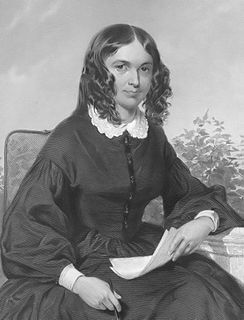
Elizabeth Barrett Browning was an English poet of the Victorian era, popular in Britain and the United States during her lifetime.

An epigram is a brief, interesting, memorable, and sometimes surprising or satirical statement. The word is derived from the Greek ἐπίγραμμα epigramma "inscription" from ἐπιγράφειν epigraphein "to write on, to inscribe", and the literary device has been employed for over two millennia.

Poetry is a form of literature that uses aesthetic and often rhythmic qualities of language − such as phonaesthetics, sound symbolism, and metre − to evoke meanings in addition to, or in place of, a prosaic ostensible meaning.
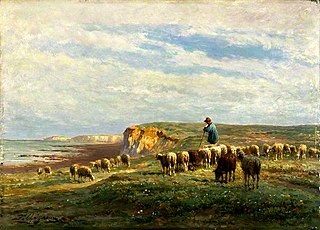
A villanelle, also known as villanesque, is a nineteen-line poetic form consisting of five tercets followed by a quatrain. There are two refrains and two repeating rhymes, with the first and third line of the first tercet repeated alternately at the end of each subsequent stanza until the last stanza, which includes both repeated lines. The villanelle is an example of a fixed verse form. The word derives from Latin, then Italian, and is related to the initial subject of the form being the pastoral.
Acmeism, or the Guild of Poets, was a transient poetic school, which emerged in 1912 in Russia under the leadership of Nikolay Gumilev and Sergei Gorodetsky. Their ideals were compactness of form and clarity of expression. The term was coined after the Greek word άκμη (ákmē), i.e., "the best age of man".

Anne Bradstreet was the most prominent of early English poets of North America and first writer in England's North American colonies to be published. She is the first Puritan figure in American Literature and notable for her large corpus of poetry, as well as personal writings published posthumously.
Syllabic verse is a poetic form having a fixed or constrained number of syllables per line, while stress, quantity, or tone play a distinctly secondary role — or no role at all — in the verse structure. It is common in languages that are syllable-timed, such as French or Finnish — as opposed to stress-timed languages such as English, in which accentual verse and accentual-syllabic verse are more common.
The objectivist poets were a loose-knit group of second-generation Modernists who emerged in the 1930s. They were mainly American and were influenced by, among others, Ezra Pound and William Carlos Williams. The basic tenets of objectivist poetics as defined by Louis Zukofsky were to treat the poem as an object, and to emphasize sincerity, intelligence, and the poet's ability to look clearly at the world. While the name of the group is similar to Ayn Rand's school of philosophy, the two movements are not affiliated.
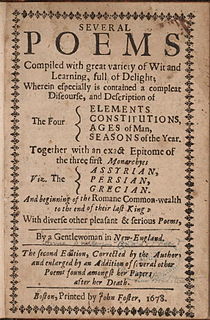
American poetry refers to the poetry of the United States. It arose first as efforts by American colonists to add their voices to English poetry in the 17th century, well before the constitutional unification of the Thirteen Colonies. Unsurprisingly, most of the early colonists' work relied on contemporary English models of poetic form, diction, and theme. However, in the 19th century, a distinctive American idiom began to emerge. By the later part of that century, when Walt Whitman was winning an enthusiastic audience abroad, poets from the United States had begun to take their place at the forefront of the English-language avant-garde.
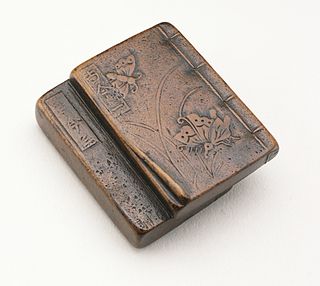
Japanese poetry is poetry typical of Japan, or written, spoken, or chanted in the Japanese language, which includes Old Japanese, Early Middle Japanese, Late Middle Japanese, and Modern Japanese, as well as poetry in Japan which was written in the Chinese language or ryūka from the Okinawa Islands: it is possible to make a more accurate distinction between Japanese poetry written in Japan or by Japanese people in other languages versus that written in the Japanese language by speaking of Japanese-language poetry. Much of the literary record of Japanese poetry begins when Japanese poets encountered Chinese poetry during the Tang dynasty. Under the influence of the Chinese poets of this era Japanese began to compose poetry in Chinese kanshi); and, as part of this tradition, poetry in Japan tended to be intimately associated with pictorial painting, partly because of the influence of Chinese arts, and the tradition of the use of ink and brush for both writing and drawing. It took several hundred years to digest the foreign impact and make it an integral part of Japanese culture and to merge this kanshi poetry into a Japanese language literary tradition, and then later to develop the diversity of unique poetic forms of native poetry, such as waka, haikai, and other more Japanese poetic specialties. For example, in the Tale of Genji both kanshi and waka are frequently mentioned. The history of Japanese poetry goes from an early semi-historical/mythological phase, through the early Old Japanese literature inclusions, just before the Nara period, the Nara period itself, the Heian period, the Kamakura period, and so on, up through the poetically important Edo period and modern times; however, the history of poetry often is different from socio-political history.
Elizabeth Daryush was an English poet.
Arthur Yvor Winters was an American poet and literary critic.
Amores is Ovid's first completed book of poetry, written in elegiac couplets. It was first published in 16 BC in five books, but Ovid, by his own account, later edited it down into the three-book edition that survives today. The book follows the popular model of the erotic elegy, as made famous by figures such as Tibullus or Propertius, but is often subversive and humorous with these tropes, exaggerating common motifs and devices to the point of absurdity.

Annie Finch is an American poet, writer, editor, critic, translator, playwright, teacher, and performer. Her poetry is known for its often incantatory use of rhythm, meter, and poetic form and for its themes of witches and feminist spirituality. Her books include The Poetry Witch Little Book of Spells, Spells: New and Selected Poems, The Body of Poetry: Essays on Women, Form, and the Poetic Self, A Poet’s Craft, Calendars, and Among the Goddesses. Her edited anthologies include A Formal Feeling Comes: Poems in Form by Contemporary Women, Measure for Measure: An Anthology of Poetic Meters, and Choice Words: Writers on Abortion, the first major literary anthology about abortion.
Susan Jennifer Lenier is an English writer. She published two books of poetry and a number of plays.
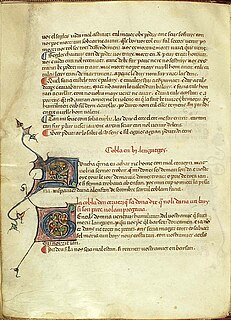
In Old Occitan literature, a tornada refers to a final, shorter stanza that appears in lyric poetry and serves a variety of purposes within several poetic forms. The word tornada derives from the Old Occitan in which it is the feminine form of tornat, a past participle of the verb tornar. It is derived from the Latin verb tornare.

"On the Pulse of Morning" is a poem by writer and poet Maya Angelou that she read at the first inauguration of President Bill Clinton on January 20, 1993. With her public recitation, Angelou became the second poet in history to read a poem at a presidential inauguration, and the first African American and woman. Angelou's audio recording of the poem won the 1993 Grammy Award in the "Best Spoken Word" category, resulting in more fame and recognition for her previous works, and broadening her appeal.
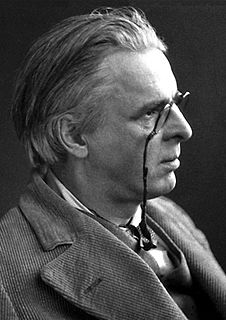
"The Circus Animals' Desertion" is a poem by William Butler Yeats published in Last Poems in 1939. While the original composition date of the poem is unknown, it was probably written between November 1937 and September 1938. In the preface, Yeats suggests that he intended the poem to combine his personal views and impressions with the customs and beliefs of Christian Ireland. The poem was the last work published in Yeats's final collection, with "Politics" following as an envoi. In the poem, the poet uses the desertion of circus animals as an analogy to describe his failure to find inspiration for poetic creation as he seeks for new inspiration. Critics have detected aspects of both Modernism and Postmodern literature in the poem.

Waka is a type of poetry in classical Japanese literature. Although waka in modern Japanese is written as 和歌, in the past it was also written as 倭歌, and a variant name is yamato-uta (大和歌).
References
- ↑ The Chambers Dictionary, Chambers Harrap Publishers, Edinburgh, 2006 ISBN 0-550-10255-8
- ↑ Eberwein, Jane Donahue, ' Early American Literature' vol 9 no 1 University of North Carolina Press Spring 1974
- ↑ 'Biography of Elizabeth Daryush' MyPoeticSide.com